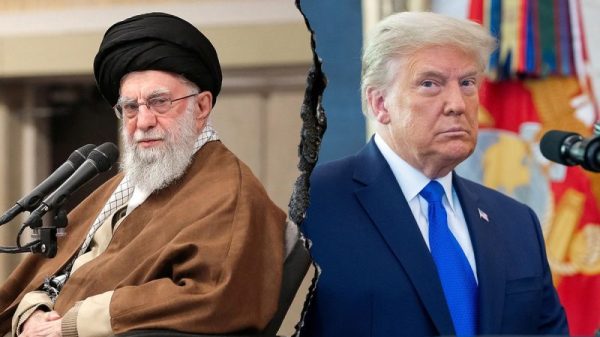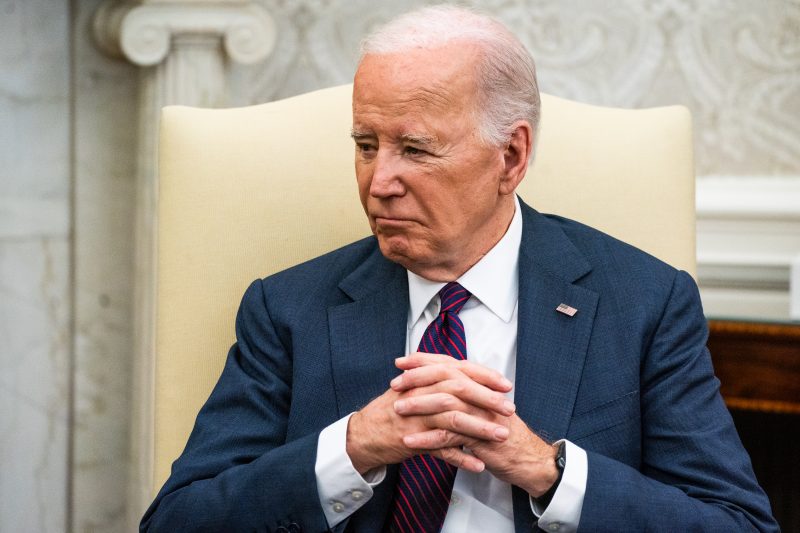Iran’s recent attack on Israel has complicated President Biden’s efforts to change Israel’s course in Gaza and introduced a new, unpredictable element into his push to prevent the Israel-Gaza war from escalating into a broader conflict.
Just days ago, Biden told Israel the U.S. would rethink its Gaza policy if Israel did not immediately address the humanitarian catastrophe unfolding in the enclave, which is on the brink of famine due to an Israeli siege — a warning that many analysts took as a sign that the president would consider imposing conditions on military aid to the Jewish state.
But following Iran’s attack on Sunday, Biden said America’s commitment to Israel’s defense is “ironclad” in its conflict with Tehran, and he renewed his push for Congress to approve more military aid to Israel.
While those two messages can coexist, they leave Biden telling Israel to change its course when it comes to one front of its conflict with its neighbors, while pledging unwavering support on another front.
“The president publicly threatened to condition military assistance so we were about to get much tougher with the Israelis, then the attack by Iran comes along and everything gets swept to the side,” said Frank Lowenstein, a former State Department official who helped lead Israeli-Palestinian negotiations in 2014. “Now we’re back into lockstep on their big security issues.”
Lowenstein added: “What’s the impact on all the priorities we had before, including the cease-fire, humanitarian assistance and settler violence, going forward?”
U.S. officials are urging Israel, in public and in private, to show restraint in response to the barrage of more than 300 drones and missiles that Iran sent toward Israeli territory overnight on Saturday. Officials have said 99 percent of the projectiles were intercepted and that the damage to Israel was minimal.
But Israeli officials said the unprecedented aerial attack could not go unanswered. They were deliberating Monday how best to respond without unduly angering their allies, whose support for Israel in the face of the Iranian assault is in sharp contrast to their criticism of the country’s conduct of its scorched-earth military campaign in Gaza.
On Monday, the White House sought to cast Tehran’s inability to cause significant damage or casualties as a resounding Israeli victory, seemingly in part to signal to Prime Minister Benjamin Netanyahu that he does not need to respond. Washington has also emphasized that it will not participate in whatever military response Israel is planning.
Biden noted to Netanyahu “that this was an extraordinary success … and that that success alone … speaks volumes about Israel’s standing in the region,” White House spokesman John Kirby said on Monday. “The president urged the prime minister to think about what that success says all by itself to the rest of the region.”
Kirby argued that the Iranian attack strengthened Israel’s strategic position and weakened Iran’s, since it suggests Tehran has little ability to harm Israel. The White House appeared to be trying to reduce Israel’s sense of vulnerability and isolation since Oct. 7, when Hamas militants rampaged easily through its defenses on the Gaza border and killed 1,200 people, many of them civilians, and took 253 hostage, according to Israeli authorities.
Israel’s retaliatory assault in Gaza has killed more than 33,000 Palestinians, according to the Gaza Health Ministry, and prompted fierce international condemnation because of the high civilian death toll and Israel’s refusal to allow a significant amount of aid to get into Gaza.
“Much of the world is standing with Israel today,” Kirby said on Monday, adding, “Unlike Iran, which is increasingly isolated on the world stage, Israel has friends.”
The Iranian action last weekend came in response to an Israeli strike on an Iranian diplomatic compound in Syria two weeks ago that killed two senior commanders. Iran said over the weekend that no additional military action was currently planned beyond the barrage of missiles and drones, but that any further Israeli action would be met with “at least a tenfold response.”
Since the Oct. 7 attacks, Israel has sought to address an array of nearby threats with military force, arguing that it must reestablish deterrence in the region. Its adversaries include not only Hamas in Gaza, but also Hezbollah on Israel’s northern border with Lebanon, where there has been an exchange of rocket fire for several months that has resulted in deaths in Lebanon. Tens of thousands of Israeli citizens have yet to return to their homes in the north because of the continued fighting.
Now, American officials are increasingly concerned that Israel is looking to confront Iran directly, moving beyond the long-standing “shadow war” between the two countries that has involved proxies and relatively limited strikes. Such a development would risk drawing in the United States, they fear, which is one reason they urged Israel so strongly on Monday not to escalate the conflict.
Despite this, Israeli leaders are signaling that they believe they must respond to a barrage of weaponry fired directly at their soil.
“One of the advantages of Israel not attacking is they can create a diplomatic effort to isolate Iran and it reduces public pressure on them on Gaza,” said Ron Halber, executive director of the Jewish Community Relations Council of Greater Washington. “The Israelis know this. The fact that they are willing to strain relations with the Biden administration over counterattacking … shows the psychological impact of October 7th on Israel’s psyche.”
Biden officials’ unease about the coming weeks is exacerbated by their concern over the mind-set of Netanyahu, who U.S. officials increasingly believe is prioritizing his own political survival above all else, potentially leading him to prolong the fighting on multiple fronts. Netanyahu is deeply unpopular among Israeli voters who blame him for the security failures that led to the Oct. 7 attacks and he faces multiple corruption charges, but it is harder for opponents to topple him in the midst of ongoing hostilities.
Many U.S. officials worry that Netanyahu is far more focused on placating far-right members of his coalition — who favor resettling Gaza, arming Israeli settlers in the West Bank and fighting Iran directly — than on heeding Biden’s pleas to de-escalate and provide more aid and protection to Palestinians. Netanyahu’s repeated rejection of Biden’s demands since Oct. 7 come despite the unwavering military and diplomatic support the United States has provided.
“There’s an awful lot of this Israeli government that wants a conflict with Iran, that sees this as their chance to perhaps get rid of the Iranian nuclear program or to get the United States involved,” said Bruce Riedel, a senior fellow at the Brookings Institution who worked on Middle East issues in the Clinton administration.
Netanyahu “is preoccupied with his political survival,” Riedel added. “He knows if there is a cease-fire, an end to this conflict, the Israeli people are going to demand accountability and he’s going to be out of office very quickly. Then he faces his corruption trials.”
The risk of escalation between Iran and Israel is also overshadowing the combustibility of the occupied West Bank. Israeli settlers in recent days went on a rampage against Palestinians there after the death of an Israeli teenager. A Palestinian was killed and dozens of others injured as settlers burned homes and cars.
While the White House has sought to pressure Netanyahu to rein in Israeli settler violence — and has sanctioned a handful of settlers accused of violently attacking Palestinians — the conflict on the West Bank may be another issue that is harder for the administration to address as it works to head off further escalation in the broader Middle East.
“If the Biden administration was frustrated before, nothing that has happened is making them less frustrated, in that it’s making it more difficult for them to change course,” one outside adviser said. “I do think what we’re seeing is an understanding that Israel is in this not just for Gaza, but to remove the threat that it has confronted and been willing to live with but is no longer willing to live with.”


































